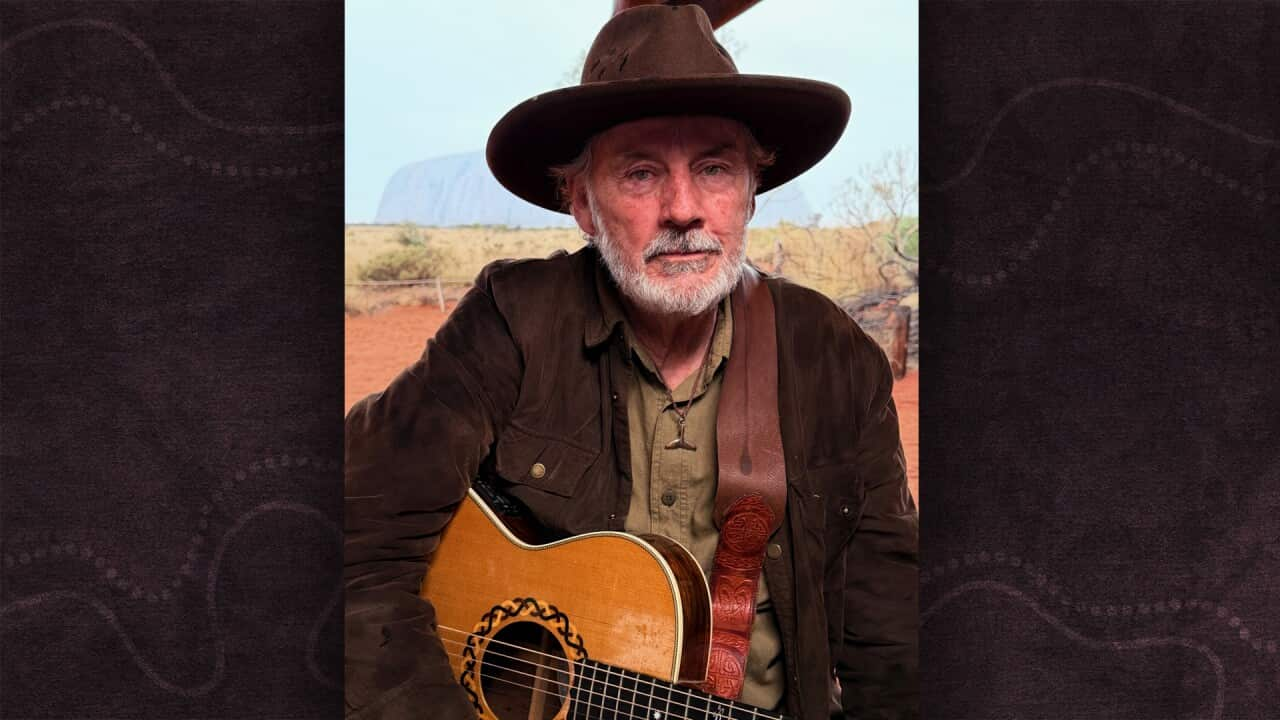In May 1981, singer-songwriter Shane Howard took a break from the relentless touring schedule of his band, Goanna, and travelled deep into Central Australia.
Burnt out and unwell, he left Victoria, crossed South Australia, boarded The Ghan in Adelaide, and trekked from Alice Springs to camp at Uluru.
Back then, there were only a handful of facilities at Uluru’s eastern end — a small campground, a few motels, a service station, and three pubs forming a rough semicircle. An airstrip was adjacent to Uluru.
The ‘Ayers Rock Campground’ was as simple as they came: red dirt underfoot, open-air showers, smoky campfires, and at night, a canopy of stars illuminating the desert sky.
Howard had come seeking rest. What he found instead was revelation.
“I just happened to come here in ‘81 and there was Inma (traditional dance ceremony) on that night,” Howard recalls.
“Uluru in the background, the sun was going down, it was getting dark, the moon was rising over the back of Uluru, and the dancers came into the fire light, and the dance starts, the singing starts - and for me, I woke up in the Tjukurpa.”
That moment — watching Anangu people perform ancient song and dance on sacred Country — changed Howard forever.
“I thought I knew what Australia was. I had no idea, this is so much older than I could possibly imagine.
"I realised there's no Aristotle, there's no Socrates or Plato here. It's a completely different foundational philosophy and cosmology to Western thinking.”
In the flicker of the campfire, the first lines of what would become Goanna’s greatest song, Solid Rock, took shape:
“Out here, nothing changes, not in a hurry anyway…”
Howard’s trip into the centre was sparked by what he’d witnessed growing up in southwest Victoria and the decimation of Aboriginal lives and cultures under the relentless shadow of colonisation that continued through brutal legislation, racism and restrictive control.
“In Framlingham and the old missions there, I saw how Aboriginal people were treated," he says.
“I think (through) my mum and dad, my Irish ancestry, we know a bit about colonisation for 800 years, and we know a thing or two about famine and starvation, which is how my people - my great grandparents - ended up here.
“There was some hunger for me to understand and when I found Aboriginal Australia, I could talk to people about the soul and about spirit and about the things that mattered to me as a musician, artist and a poet.
“I found a way to belong in this country that mattered to me - it meant something to me.”
For Howard, it was the beginning of a deeper sense of belonging — one grounded in respect for the world’s oldest living culture.
“I wanted to say to people really at the time ... here is Australia here.
"It's not meat pies ... and Holden cars. That's a part of it but this is an old story.
"There's the dreaming stories, there's Songlines across the country, they're tens of thousands of years old. Who wrote these songs? Someone had to write them. The song men wrote them.”
A few months after Howard’s trip to Uluru, Goanna had signed with WEA Australia and headed into the studio to record their debut album Spirit of Place and wanted Solid Rock to be the first song released, but the record company disagreed.
“Yeah, I didn't think it was a commercial song, and neither did the record company, by the way, they thought it was too political. I did too.
"But, you know, it made it onto the charts. It made it into the Australian psyche, and it's stuck there.”
With the opening lines being drawn from his cultural experiences and awakening at Uluru, Howard penned the song’s other verses angered by what he saw when he returned to Alice Springs.
“Well, the first two verses are not angry. They're actually about 'out here nothing changes, and you feel the endlessness' - just telling that Country, and then the second verse is about the dawn of time – Tjukurpa.
“It's the third verse that gets angry.”
“And that third verse wasn't written here, this comes out of going back to Alice Springs after here, after this beautiful experience, cultural experience here, I saw the racism and the neglect and the abuse and that’s when it became an angrier song.
“And it was like, hold on. I've just seen something really powerful that has transformed my thinking about everything about this country. And here are non-Indigenous people treating Aboriginal people in our own country - that we stole - like third rate citizens.”
“And so that's when standing on the shore came in. You stole this. You took everything.”
Today, his message remains one of truth-telling, respect and reconciliation - to embrace such a deep, rich story which includes acknowledging and learning about past injustices and treatment.
“Archie (Roach) and I used to talk about we had to build bridges to each other so our children could cross them freely. That's the kind of country we want to live in. Don't be cowardly. Let's face up to this.”
“Aboriginal Australia broke my heart when I entered into it, but it made my heart and what it's the journey we have to go on, and we will be a better nation for it.
“And why not be a beacon of hope in a really troubled and confused world?”
The Point unpacks the 40th Anniversary of Handback of Uluru, tonight at 7.30pm on NITV and will be available after broadcast SBS On Demand.
Delve into the latest Indigenous news and features from NITV's agenda-setting program, The Point. Read more about NITV
Have a story or comment? Contact Us


